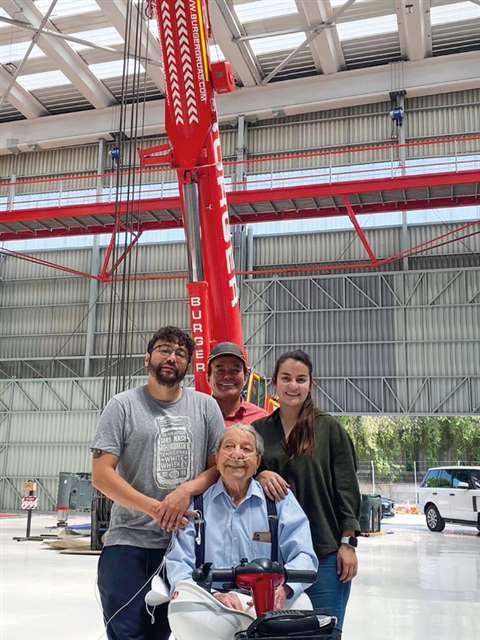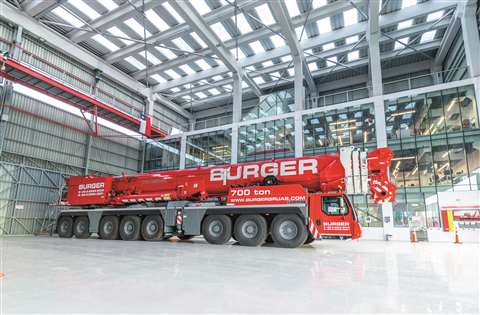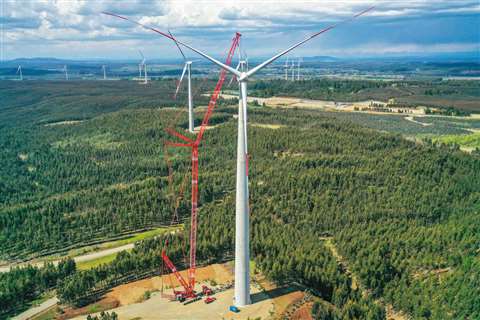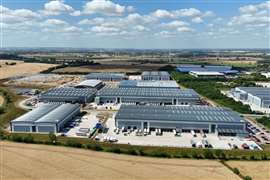Burger Group: Covid fightback, new products and expansion plans
09 January 2022
Chilean crane rental house Burger Group is in a growth phase. Stacy Burger explained the expansion and upcoming challenges to Cristián Peters, editor of ICST sister magazine Construcción LationAmericana (CLA)
The Burger Group, a Chilean company with more than 40 years of experience in the domestic market, continues to grow and look for new alternatives to expand its borders. The company founded by Raúl Burger Rojas (1933-2021) is now led by his son Raúl Burger Torres and grandchildren Stacy and Erich.
 Three generations: Burger Group’s late founder Raúl Burger Rojas, front, with grandson Erich, left, granddaughter Stacy, right, and son Raúl Burger Torres
Three generations: Burger Group’s late founder Raúl Burger Rojas, front, with grandson Erich, left, granddaughter Stacy, right, and son Raúl Burger Torres
The company featured on the front cover of the June 2021 issue of ICST as part of the long-established IC50 ranking of the world’s largest crane-owning companies.
Since its inception Burger has experienced strong growth which made it an important reference in the lifting and specialized transport of oversize and-or overweight loads. An interesting fact that supports the company’s specialization is that it is responsible for the installation of more than half of the wind turbines in Chile.
Cristián Peters talked to Stacy Burger, Burger Group marketing manager, who spoke about the growth the company has experienced, its challenges and the new equipment being acquired to further increase the fleet.
CP: What are the growth challenges for a family business in this sector?
SB: The company was founded by my grandfather Raúl Burger Rojas – may he rest in peace – and then my dad joined the company in 1996 and continued the legacy and drove it to be the leading company it is today. A year ago, and my brother five years ago, we joined and are in transition from being the third generation of the family in the lifting world.
Being a family business gives us a competitive advantage because today large corporations have documentary and decision-making processes that are very extensive. Instead we, as long as we agree as a family board, can make investment and business decisions quickly. This agility is what customers are looking for. We can adjust to the immediate needs they have in the market, which I think is an advantage rather than a weakness.
How have you dealt with the Covid pandemic?
The beginning of the pandemic was, for everyone, challenging, especially because our field is face-to-face services. Everything involving communication technologies and also to safeguard the health of our employees, became difficult, as it did for most companies in the field. It has to do with how we shifted to teleworking, being that we were very used to being on the ground in the plant. We had to adapt.
Once we overcame that great challenge, in the second semester we set out to accelerate the year and fortunately managed to recover. We closed with a good year. This year too the expectation is to continue accelerating. We have already received new cranes and new trucks, for example, a Liebherr LTM 1650-8.1, the first in Chile, that is already in the port of San Antonio, in addition to two other LTM 1120-4.1 wheeled mobile telescopic cranes.
Will this crane be aimed at a particular industry?
A great benefit of this 700 tonne capacity equipment is that it is on tyres so it works both for mining and for the installation of wind turbines. Being a large crane it is very versatile, which allows us to operate according to the needs of the business.
I am proud to say today we have a fleet of 50 high-tonnage cranes. It is a mix between hydraulic telescopic and lattice jib cranes. They range in lifting capacity from 50 to 700 tonnes, with the LTM 1650-8.1 at the top.
You also have specialized transport services.
 Burger’s newest fleet-topping addition is the first unit in Chile of Liebherr’s new 700 tonne capacity LTM 1650-8.1 wheeled mobile telescopic crane
Burger’s newest fleet-topping addition is the first unit in Chile of Liebherr’s new 700 tonne capacity LTM 1650-8.1 wheeled mobile telescopic crane
Exactly, we have a subsidiary company with a fleet of special transport equipment that has almost 20 trucks.
Today the model is to offer customers a complete service. From the corresponding port we transport the turbine then install it and leave it ready for operation. It makes sense, we must take advantage of synergies that have to do with the conversation between companies. In this way our transport fleet co-ordinates very well with our fleet of cranes and the wind parks are made more efficiently.
What are the most important industry sectors for the company?
Clearly mining is one of our fundamental pillars. Today we work in the north and in the centre of the country with more than five major mining companies. They are long-term contracts of five or six years. We are, however, also very interested in renewable energies, as, for example, we are planning to work on a new green hydrogen plant, unique in Chile. We are also the company that has set up the most wind farms in the country. (Burger has installed more than half of the existing wind turbines in Chile).
I would not like to leave only these groups as important. In addition, we specialize in everything that has to do with industrial procedures, from the metro to whatever we can think of.
Are you looking at the possibility of expanding outside the country?
Indeed, a couple of years ago we had conversations, especially in countries such as Perú and Colombia. It is very interesting. First, because of the proximity, but second because in these two countries there are many wind projects in the planning phase.
I would say that we have not done so but we are ‘at the gates.’ Our fleet has a 95 per cent utilisation rate so, before internationalising we have to finish capitalising internally the projects we are executing. After covid the recovery is progressing and the fleet is quite busy. We have not yet closed the plans in Peru and Colombia, but that is what comes later.
When could this internationalization be?
One year is the deadline we set ourselves as a company and that’s where the plans are headed.
Would it be Burger Group or in partnership with a local company?
 Wind energy work is a mainstay of activity for Burger
Wind energy work is a mainstay of activity for Burger
We are evaluating. There is a feeling of camaraderie with all the companies we have talked about in both Perú and Colombia and the idea is to make a joint venture. It makes a lot of sense for us to have alliances between Latin American countries to take these projects forward.
How has the Burger Academy evolved?
Academy Burger started in 2019 and was intended to contribute to the development of local communities by training high-tonnage lifting professionals. It has been a success. We have trained more than 200 operators and riggers, both internal and external. This is thanks to, first, our teachers, who have more than 30 years of experience and, second, because this academy contemplates a lot of technology. Let’s have a simulator called Burger 4D that allows you to practice real cases before getting on the crane – we are minimising the risks as much as possible.
Operators go through practical and theoretical online courses and simulators. We are very proud to contribute to the development of people.
The teams are very happy and so are we. We want to continue with the evolution of the Academia and hopefully continue to outsource it so that more people can access it.




